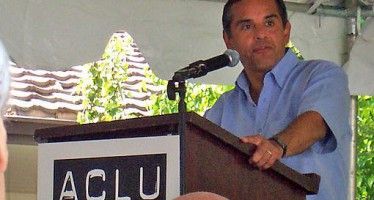Bye-bye budget deadline
June 15, 2010
By LAURA SUCHESKI
Boiled down, the state government has one big job: levy taxes and spend the revenues. But California’s statutory budget deadline passed again today with little notice from Sacramento lawmakers. The Legislature hasn’t met the deadline since 1986, calling into question why the state has a statutory deadline to begin with. The missed deadline becomes serious when the state starts a new fiscal year on July 1; if the state runs out of money, it might have to start issuing IOUs again, something they’ve only done during the Depression and last year.
Lawmakers, of course, point across the aisle when asked to identify the primary roadblock to a budget.
In May, the governor proposed revisions to his first budget plan. Most controversial were his cuts to CalWORKs, the state program that gives welfare aid to needy families with dependent children, to state-funded childcare and to mental-health services.
His plan also contained some “cost-shifting” measures, including a proposal to move convicts from state prisons to county jails. This would constitute a change in sentencing laws, but would actually cause the counties to take title to prisoners they ordinarily would not have the capacity or resources to cover financially.
Assemblyman Jim Nielsen, R – Gerber, a member of the Budget committee, said of the governor’s plan in a press release on June 15, “With the exception of key prison and parole issues, the governor’s plan is a good place to start final negotiations. The governor’s proposal reduces spending and does not raise taxes. But where has the Legislature been for six months? Debating such trivia as banning smoking on state beaches.” (And throwing a reception for LGBT activists.)
Wherever they’ve been, Assembly and Senate Democrats haven’t agreed on a strategy yet. Averse to cuts to state spending for the needy, they’ve balked at the idea of welfare cuts. After the governor’s May revisions, Speaker John Perez unveiled a “California Jobs Budget,” designed to support those already out of work while they presumably find one of the ample, available jobs in California’s private sector. Don’t mind the 12 percent-plus unemployment rate.
Assembly and Senate Democrats disagree how to fund their plan. Assembly Democrats, who risk losing some seats in November, want to fund it with “gifts from the future” – essentially borrowing money from the future revenues of existing state programs. Senate Democrats prefer to fill the budget gap with billion-dollar tax increases. Republicans and business groups fear it will be harder for anyone to find a private-sector job with increased taxes forcing businesses pack up and seek their fortunes elsewhere.
Readers may remember 2008 as the worst budget year ever, with overnight floor sessions that resulted in final deal with a few turncoat Republicans. The dramatic compromise put Sen. Abel Maldonado’s top-two primary on the ballot, to help moderates like Maldonado win future elections. Other Republicans retired after finding their “heads on a stick,” severed by conservative voters who consider a Republican voting for new taxes nothing short of treason.
The Assembly and Senate Budget committees have been meeting for the past few days to hammer out a package to serve up to opposition. Republicans have expressed discontent with the Democrats’ ideas, suggesting that they will not reach a compromise easily. Senate Republican Leader Dennis Hollingsworth, R-Murrieta, said today “the budget proposals Democrats have put forward so far are financially irresponsible or illegal.”
Gov. Arnold Schwarzenegger, anticipating a long fight ahead, called his first meeting of the “Big 5” yesterday afternoon to lay the foundations for negotiation between Senate and Assembly party leaders. In 2010, the economic situation is worse and the interests on both sides are more entrenched in the battle to preserve whatever jobs they can.
The state’s crippling inability to produce a budget stems from more than partisan politics. A two-thirds requirement to pass the budget means that Republicans, who have a few more members than one-third of each house, are a powerful minority. Their reluctance to agree to a budget with higher taxes keeps their agenda on the table for a long time. And a large part of the budget is out of legislative control. Ballot box budgeting by voters prevents lawmakers from cutting established programs or diverting the money to other sources. The only way to redirect that money is through another initiative.
Reform groups see opportunity in the crisis. California Forward, a bipartisan group advocating constitutional budget process reform, told CalWatchdog “the current budget crisis provides California with the opportunity to finally address the long-neglected need for lasting and fundamental budget reform, and we believe voters will join us in urging lawmakers to take it. Our government hasn’t kept pace, and the global economic crisis has pushed our outdated methods right to the breaking point.” California Forward and other groups advocate lowering the passage requirement to a simple majority.
But with state lawmakers quickly exhausting their supply of smoke and mirrors, voters should first expect a record-setting stalemate. There’s no telling when the Democrats will reach a consensus and bring a plan to Republicans, an obstacle that could push the possibility of a deal into the fall. Elected officials on both sides worry the stalemate could bring back “Furlough Fridays” and IOUs dangerously close to the November election.
Related Articles
Will CA green-energy policies backfire like Germany’s did?
Will California’s new green energy regime suffer the same fate as Germany’s Energiewende? In Europe, wholesale prices for solar and wind
Jail For UC Davis Embezzler
JUNE 6, 2011 By K. LLOYD BILLINGSLEY Former UC Davis official Jennifer Beeman was sentenced on Thursday to 180 days
Villaraigosa will not pursue 2016 Senate seat
Former Los Angeles Mayor Antonio Villaraigosa announced he won’t challenge state Attorney General Kamala Harris for the U.S. Senate seat



